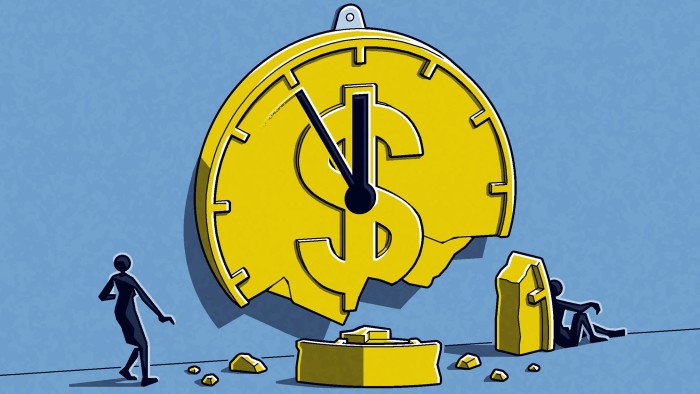Unlock the White House Watch newsletter for free
Your guide to what Trump’s second term means for Washington, business and the world
In 2019, I wrote a column about the coming “dollar doomsday scenario” in which a fundamental shift in globalisation and towards a post-Bretton Woods system would lead to a fall in both the value of the US dollar and dollar assets. This would raise bond yields, as well as the price of gold and various foreign currencies.
And here we are. The S&P may rise and fall on President Donald Trump’s daily mood swings, but the die for a new era has been cast.
While I’ve never been great at predicting the timing of big market shifts — as a child of immigrants, I tend to de-risk too early — I do have a strong worldview. I hold fast to the idea that the entire paradigm for investing is changing, and that rebalancing away from the US market is important. This will be the case with or without a trade war.
Even if Kamala Harris were in office today, we’d be in a post-Washington consensus world (the Biden White House said as much). We’d also be heading, albeit more slowly than we are now, to a multi-polar world in which the dollar and dollar assets are no longer the only game in town.
Few big investing stories hold for much more than a decade, and the US has been on top for far longer than that. The highly financialised, concentrated, debt-driven model that put it there is tapped out in ways that go beyond Trump and his antics.
I’d point to three fundamental issues, starting with an over-reliance on asset price-driven economic growth. Nearly all major US economic decisions of the past half-century have been about bolstering asset prices — from interest rate deregulation in the late 1970s to the legalisation of share buybacks to tax-favoured “performance pay” in shares, which created Silicon Valley’s massive paper wealth.
Trump and his aides talk about how Main Street doesn’t care about stock prices. But the fact that asset price growth has so wildly outstripped income growth means we are all more reliant on capital markets.
The exposure of US households to stocks is near an all-time high (equities and mutual funds represent 26 per cent of total household assets), which implies much more vulnerability to any market downturn, for both individuals and the overall economy.
Consider that since 1995, “equities have become the marginal driver of US Federal tax receipts,” according to a January presentation by analyst Luke Gromen. “If stocks fall too far and stay down, US consumer spending and GDP will go into recession, sending deficits up,” he writes. This would come at a time when inflation remains a worry and risk premiums that investors are demanding for US assets are rising.
Tariffs or not, most analysts believe there is a bigger US share price correction to come. US stocks are still overvalued relative to their peers. And the IMF’s latest financial stability report tagged this as a big risk to global markets.
Another significant concern I have about US markets is the sharp increase in private sector debt and leverage over the past few years. Corporate borrowing from private credit markets has been booming, particularly from companies that would have been considered too risky for bank loans.
Many of the private credit funds doing the lending have maturity dates, meaning a period at which they can no longer roll over loans, that will come due between now and 2027.
As Corey Frayer, a former senior SEC adviser on financial stability and now director of investor protection at the Consumer Federation of America, points out to me: “If you had a downturn in the business environment at the same time that a lot of private credit comes due, you may see multiple bankruptcies.”
This could eventually result not only in shadow banking failures but problems in the formal banking sector, which is far more exposed to non-bank entities than it was in 2008, when the global financial crisis erupted.
The final point to make concerns the introduction of additional risk into the US financial system in the form of cryptocurrency, at a time when the Trump administration has taken a lax attitude towards regulatory enforcement, actively cut staff at the Securities and Exchange Commission and gutted the Consumer Financial Protection Bureau.
Republicans and Democrats alike have supported the Genius Act, which would open the floodgates to the use of crypto in the real economy, potentially amplifying the risks laid out above.
The Biden government was already forced to de facto support the crypto platform Circle when Silicon Valley Bank failed. The new legislation, which recently passed initial hurdles in both the Senate and House of Representatives, would encourage more formal and informal players to get into crypto, which is of course an area that both President Trump and his consigliere Elon Musk have a vested interest in.
I’m not necessarily predicting that a corporate debt or crypto-fuelled liquidity crunch will take down the US economy — although I wouldn’t be surprised if the next financial crisis came from those areas. Rather, my point is that you don’t have to believe that a trade war is imminent to see that American asset markets are increasingly risky and still overpriced. Add to this the trust deficit created by Trump, and I’d say the dollar doomsday scenario still has room to run.
rana.foroohar@ft.com


